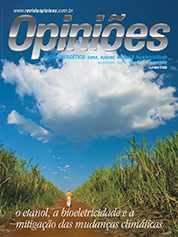Alan Charlton
Ambassador of the United Kingdom to Brazil
Op-AA-22
For us, there is no Plan B
In December, the attention of the world leaders will be focused on the negotiations of a new global agreement on the climate. The British Prime Minister, Gordon Brown, hopes that the Copenhagen Climate Conference will stand out as one of those moments in which nations unite to make history. For us, there is no Plan B. There is no second chance when the issue is climate change.
The British government has worked incessantly to create public policies that foster the reduction in greenhouse gas (GHG) emissions, and it has already complied with the targets set under the Kyoto Protocol, with reductions of 18.4% in 2007, above the mandatory targets set at 12.5% (based on the 1990 emission levels). Recent projections show that one may expect emission reductions of 23% by 2010.
In the field of renewable energy, the government assumed the commitment of using 10% of renewable fuel in the transportation sector, in compliance with the Renewable Energy Directive (RED), approved by the European parliament at the end of last year. We believe that sustainable biofuel nowadays is one of the most important alternatives, both in terms of GHG reductions in the transportation sector, as well as to increase countries’ energy safety.
For those reasons, fostering its use nowadays is more than a legal obligation – it is a reality. The fact of the matter is that initiatives such as that of the British Government are expected to benefit Brazil, given that the demand for biofuel will increase and, consequently, foster the development of a global market. Brazil plays a fundamental role, given that apart from being an energy powerhouse ? in particular, the world’s second largest producer and largest exporter of biofuel, the country holds a strategic lead position in Latin America.
Brazilian ethanol is in fact known around the world for having the largest potential to reduce greenhouse gas among all first generation biofuels, increasing the prospects of exporting the product to Europe. Currently, the European countries are debating sustainability criteria that will be the basis for the certification of biofuel sold in the domestic market.
We believe this process must be viewed as an opportunity for Brazil, since ethanol clearly entails advantages over other biofuels, reaching emission reduction rates that are higher than those required by the European directive, among other criteria. This advantage is evidenced by recent data on domestic biofuel consumption in the United Kingdom, made public by the British Renewable Fuel Agency - RFA, showing that 85% of the ethanol used in the country comes from Brazil. This is the unequivocal acknowledgement of Brazilian leadership in this field.
In this context, I would like to highlight Brazilian efforts in seeking to constantly improve this sector, both with respect to new technologies and the search for higher efficiency in processes in agriculture and industry. I also want to commend Brazilians for their engagement in developing public policies that seek to meet the social and environmental criteria currently being debated, such as the Sugarcane Agro-ecological Zoning initiative and the National Commitment to Perfect Sugarcane Working Conditions.
Such policies attest to the country’s commitment to environmental preservation and warrant sustainability of Brazilian biofuel. The medium term challenge will be to consolidate the global biofuel market, increasing supply and demand. Considering the geographic limitations of Europe, the United Kingdom has been fostering and promoting the use of second generation biofuel and, in partnership with Brazil, supporting a joint exchange program between researchers of Embrapa (the Brazilian agriculture and livestock breeding research company) and British universities.
In comparison with Brazil, the United Kingdom is not expected to adopt too ambitious policies aimed at creating a domestic market, given that in the medium and long-term we are betting on hybrid and electric cars. We can, however, bet on a policy to increase the mixture of ethanol added to gasoline. Thus, we expect to intensify our dialogue with Brazil in this so promising field, working with the Brazilian government to consolidate the global biofuel market. We trust in that such initiatives are essential to face the largest challenge of our generation: to accelerate the transition to a global economy of high growth and low carbon emissions.




